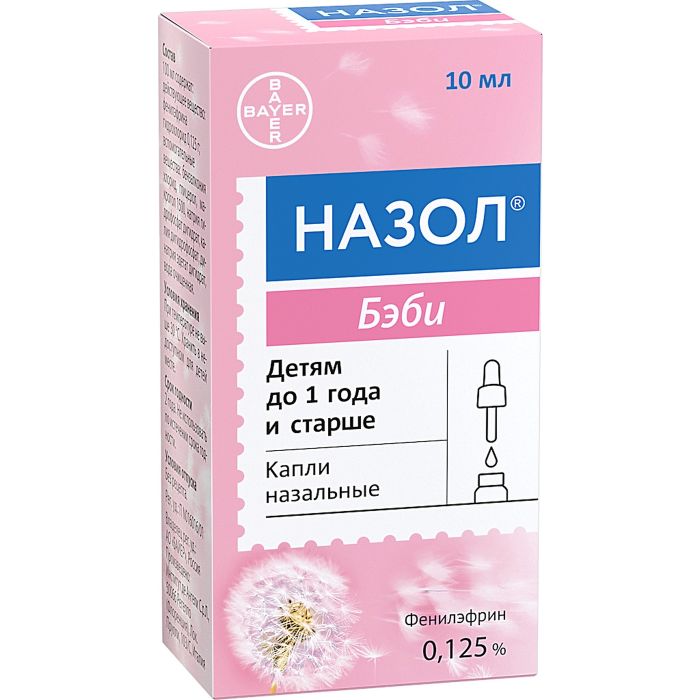Nazol Baby, nasal drops, 10 ml
Category
Runny nose
Scope of the medicinal product
Ear, Throat, Nose
Release form
Drops
Manufacturer country
Italy
Package quantity, pcs
one
Release form, composition and packaging
Nasal drops 0.125% in the form of a clear solution, from colorless to light yellow, odorless.
100 ml
phenylephrine hydrochloride 0.125 g
benzalkonium chloride - 0.018 g, glycerol - 5 g, macrogol 1500 - 1.5 g, sodium hydrogen phosphate dihydrate - 0.226 g, potassium dihydrogen phosphate - 0.101 g, disodium edetate dihydrate - 0.02 g, purified water - 94.76 g.
5 ml - polyethylene bottles (1) - cardboard packs.
10 ml - polyethylene bottles (1) - cardboard packs.
15 ml - polyethylene bottles (1) - cardboard packs.
30 ml - polyethylene bottles (1) - cardboard packs.
pharmachologic effect
A vasoconstrictor drug for topical use in ENT practice, is an agonist of α 1-adrenergic receptors (sympathomimetic).
It has a vasoconstrictor effect by stimulating β 1-adrenergic receptors in the nasal mucosa: reduces swelling, congestion and hyperemia of tissues in the nasal mucosa, and also improves the patency of the nasal airways.
Pharmacokinetics
With local application of the drug, systemic absorption is low.
Indications for use
To facilitate breathing through the nose when:
- colds and flu
- hay fever or other allergic diseases of the upper respiratory tract, accompanied by acute rhinitis or sinusitis.
Contraindications for use
- diseases of the cardiovascular system (including coronary sclerosis, angina pectoris)
- hypertensive crisis
- thyrotoxicosis
- diabetes
- hypersensitivity to drug components.
The drug is used with caution in children under 6 years of age.
Dosage regimen
The drug is administered intranasally.
The duration of treatment is no more than 3 days.
For children under the age of 1 year, a single dose - 1 drop no more often than every 6 hours.
For children aged 1 to 6 years, a single dose is 1-2 drops.
For children over the age of 6 and adults, a single dose is 3-4 drops.
For instillation, you must slightly squeeze the bottle, holding it upside down.
After use, wipe the pipette dry on the bottle.
Overdose
There are no data on drug overdose.
Symptoms: possible with systemic absorption - ventricular extrasystole, short paroxysms of ventricular tachycardia, a feeling of heaviness in the head and limbs, excessive increase in blood pressure, agitation.
Treatment: intravenous administration of short-acting alpha-blockers (phentolamine) and beta-blockers (for rhythm disturbances).
Side effect
From the side of the central nervous system: headache, dizziness, tremor, sleep disturbance.
From the side of the cardiovascular system: palpitations, arrhythmias, increased blood pressure.
Local reactions: sometimes - burning, tingling or tingling in the nose.
Others: sweating, pallor.
Drug interactions
MAO inhibitors (procarbazine, selegiline), tricyclic antidepressants, maprotiline, guanedrel, guanethidine increase the pressor effect and arrhythmogenicity of phenylephrine (with systemic absorption).
Thyroid hormones increase (mutually with systemic absorption of phenylephrine) the associated risk of coronary insufficiency (especially in coronary atherosclerosis).
Application during pregnancy and lactation
There is no sufficient experience in using the drug during pregnancy.
The use of the drug during pregnancy and lactation (breastfeeding) is possible only if the intended benefit to the mother outweighs the potential risk to the fetus or child.
Special instructions In children under the age of 1 year, the drug should be used strictly according to the doctor's prescription and no more often than every 6 hours. In children, systemic absorption of phenylephrine and the associated risk of side effects is higher than in adults.
Phenylephrine should not be prescribed to patients within 2 weeks after discontinuation of MAO inhibitors, as they could
Name ENG
NAZOL BABY
Clinical and pharmacological group
A vasoconstrictor drug for local use in ENT practice
ATX code
Phenylephrine
Dosage
0.125% x 10ml
Structure
1 fl.
contains: active substance: phenylephrine hydrochloride 0.125 g
Indications
symptomatic treatment of acute rhinitis or sinusitis with colds, flu, allergic diseases of the upper respiratory tract.
INN / Active ingredient
phenylephrine hydrochloride
Contraindications
increased individual sensitivity to the ingredients of Nazol Baby diseases of the cardiovascular system (including coronary sclerosis, angina pectoris) hypertensive crisis thyrotoxicosis diabetes mellitus. With caution: children under 6 years of age pregnancy lactation.
Storage conditions and periods
At a temperature not higher than 30 degrees.
Expiration date: 2 years
Specifications
Category
Runny nose
Scope of the medicinal product
Ear, Throat, Nose
Release form
Drops
Manufacturer country
Italy
Package quantity, pcs
one
Minimum age from
No restrictions
Way of introduction
Through the respiratory tract
Vacation conditions
Without recipe
Volume, ml.
10 ml
Brand name
Bayer
The amount of the dosage form in the primary package
10 ml
Primary packaging type
Bottle
Type of consumer packaging
Pack of cardboard
Pharmaco-therapeutic group
Decongestant - alpha adrenergic agonist
Anatomical and therapeutic characteristics
R01AA04 Phenylephrine
Dosage form
Nasal drops
Dosage (volume) of the substance in the preparation
phenylephrine hydrochloride 0.125 g
Expiration date in days
730
The target audience
Children
Package weight, g
45
Mode of application
:
Nazol Baby is used intranasally, squeeze the bottle slightly, holding it upside down.
For children under the age of 1 year: a single dose - 1 drop no more often than every 6 hours For children aged 1 to 6 years: a single dose - 1-2 drops For children over the age of 6 and adults: single dose - 3-4 drops. After use, wipe dry the pipette on the bottle. The duration of treatment is no more than 3 days.
Information on technical characteristics, delivery set, country of manufacture

